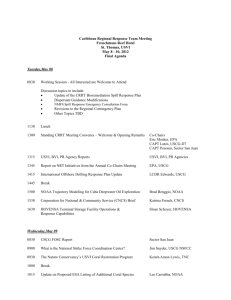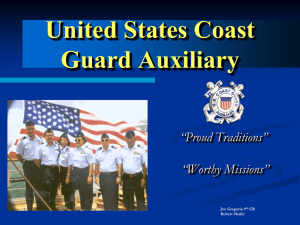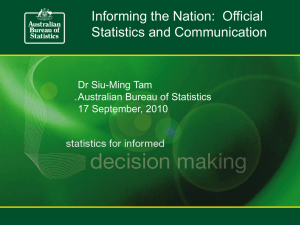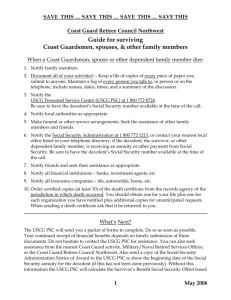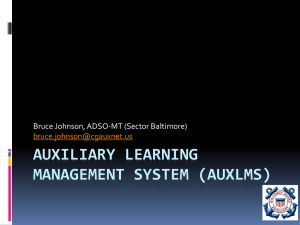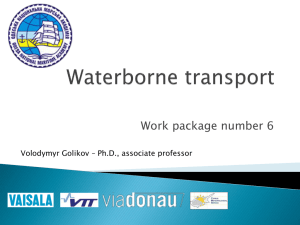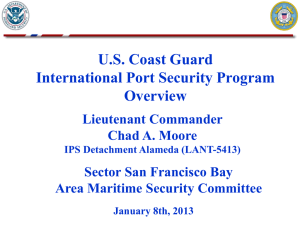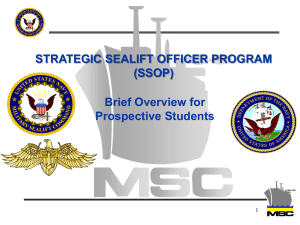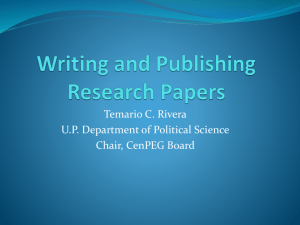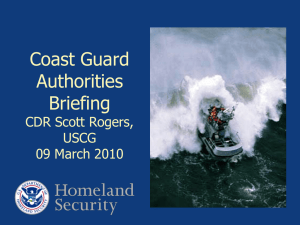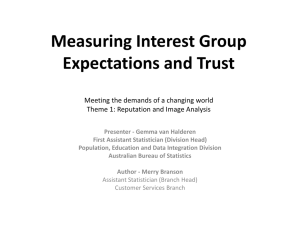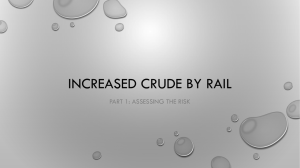12 - ABSG Consulting - Nicholas Squires
advertisement
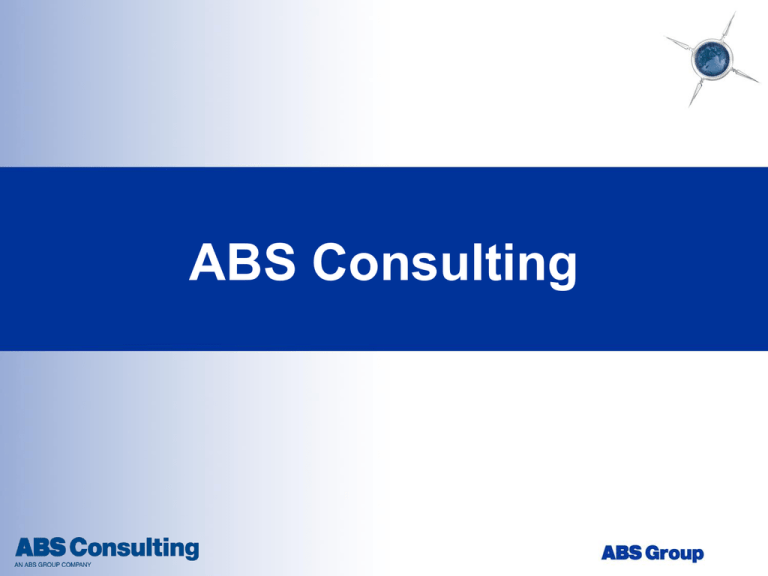
ABS Consulting The American Bureau of Shipping (ABS) Founded in 1862 to serve as the non-profit American Classification Society Mission Serve the public interest as well as the needs of our clients by promoting security of life, property, and the natural environment primarily through the development and verification of standards for the design, construction, and operational maintenance of marine-related facilities Primary Applications Commercial vessels Offshore structures Public vessels (e.g., Naval Vessel Rules) http://rapidshare.com/files/361712474/CPuse.part1.rar ABS Consulting Wholly-Owned Subsidiary of ABS (Bureau) Global Safety, Risk & Integrity Management Serving Oil & Gas, Chemical Processing, Pipeline, Marine, Power Generation, Financial, Corporate and Government Sectors Corporate Headquarters in Houston, TX USA Diverse Range of Services Asset Integrity Management Project Quality Management Risk Analysis and Modeling Blast Hazard Analysis Inspection & Auditing Reliability & Maintenance Management Design Assessment Process Safety & Safety Culture Training Our Public Sector Value Proposition Benefits to Customers Meet/Exceed Mission Performance Goals Manage Costs and Resource Allocation Maximize Readiness To Perform Mission Mission Assurance/ Continuity of Operations Manage Program & Project Risks Achieve/Exceed Environmental Goals Fulfill Other Regulatory/ Legal Responsibilities Operational Compliance Domain Architect-Engineer & Knowledge Design-Build/Retrofit Risk Modeling/ Lifecycle Management & Management SystemsRisk Engineering and Technical Assistance (SETA) Customer Mission Performance Goals Achieve/Exceed Safety & Health Goals ABSG’s Key Integrated Lifecycle Service Areas Service Approach Risk-based Performance Management Strategies Customer Requirements Practical Engineering and Operational Analysis & Advisory (A&AS) Solutions Enabling Program Management & Project Technologies Quality Management Implementation Services Training & Exercise Support (staff support, training, etc.) Sample Project Experience USCG Evolution to Risk-based Management Compliancebased Continual Improvement Risk-based Decision Making Enterprise Risk Management What do I have to do? How can I keep these things from happening again? How can I achieve a tolerable level of exposure? How can I best allocate my prevention resources? Pre-1994 Mostly reactionary responses to incidents that occurred for major strategic and budgetary shifts (e.g., Exxon-Valdez) Isolated uses of risk assessments (using any number of methods/tools) to support specific decisions when deemed necessary Most risk assessments conducted by outside resources (consultants and academics) using their own philosophy, terminology, methods, and tools Periods of frustration with reactionary approach created a desire for proactive management of risks 1994-2005 Established objective of building a Core Competency in RBDM Built framework for consistent RBDM (lexicon, guidelines, toolkits, technical assistance, integrated training, sharing of applications, senior management visibility, etc.) Developed in-house practitioners partnered with ABS Group risk experts Developed organizational expectation of using RBDM for various high profile issues at Headquarters and in the field) Organization-wide propagation of many RBDM method/tools for specific purposes (consistent with framework) Interest in “rolling up” information develops 2005-Present Continues to develop and use myriad of issue-specific risk methods/tools for specific applications across the mission space (mission risk, program risk, project risk, financial risk, health/safety/env. risks, etc.) Emphasis on integrated risk-readinessresource management from national down to local levels under the Enterprise Leadership Architecture Emphasis on better managing major investment risks (Deepwater, MDA, etc.) using risk-based management and requirement prioritization ABS Group Support for the USCG 2010 2009 2008 System Engineering & Technical Assistance (SETA): Provide subject matter expertise to augment the RDC’s capacity, acquisition experience, and technological expertise in its role as advisor and consultant to the Coast Guard Acquisition Directorate (CG-9) and their sponsors. Reliability Centered Maintenance (RCM): Provide Naval Engineering RCM Program Support ; assist the USCG SFLC to realign the CG’s logistics organization to control costs, and improve accountability. 2007 Capital Investment Analysis and Operational Planning Risk-reduction value case for the current portfolio of USCG capital investments, leveraging the National Maritime Strategic Risk Assessment 2006 Security Risk Support: Maritime Security Risk Analysis Method (MSRAM); Port, Waterway, and Coastal Security (PWCS) Mission Standards; Marine Transportation System (MTS) Security Plan; Blast Consequence Assessments ; Port-level RPM Applications; Security Barrier Layer of Protection Analyses; G-PCP support 2005 Mission Risk Support: Enterprise Leadership Architecture Implementation Support (with MSI and GrantThornton), including Integrated Risk-Readiness-Resource Management, Risk-based Budgeting Analysis, and Performance Measurement and Reporting 2004 2003 2002 2001 2000 1999 1998 1997 1996 1995 Security and Mission Risk Support: Risk-based Performance Management (RPM); Area Strategic Assessments, HQ Strategic Assessments, and the National Maritime Strategic Risk Assessment (NMSRA); RBDM Applications for Maritime Domain Awareness (MDA Security-related RBDM Applications: Port Security Risk Assessment Tool (PS-RAT); National Security Risk Assessment Tool (N-RAT); National Maritime Security Risk Profile (NMSP); National Incident Command Risk Assessment Tool (NIC-RAT); and Numerous Issue-specific Workshops (red-flag barges, LNG vessels, underwater security, WMD/CBRNE risk/readiness, high-interest vessels, container security, border security, USCG AT/FP, etc.) Risk-based Decision Making (RBDM) (through the R&D Center): RBDM Guidelines; Portwide Risk Analysis (all hazards); Issue-specific Workshops on High Risk/High Profile Issues in Ports Across the Country; Training and Support to Institutionalize an RBDM Core Competency System Risk Management (through the R&D Center): Portwide Risk and Resource Management Strategies; Enterprise Risk Management Research; Enterprise LEADER™ Software for USCG Applications Loss Exposure and Risk Analysis Methodology (LERAM) (through the R&D Center): Hazards Analysis; Standards Compliance Rating System; Integrated Safety/Risk Analysis; Loss Prevention Management Systems; Risk-based Maintenance Strategies for Assets; Performance Measurement Best Practices USCG RDC Systems Engineering Technical Assistance Provide subject matter expertise to augment the RDC’s capacity, acquisition experience, and technological expertise in its role as advisor and consultant to the Coast Guard Acquisition Directorate (CG-9) and their sponsors. FUNCTIONAL AREAS Requirements, Alternatives, Cost and Operations Systems Engineering and Planning Human Systems Integration (HSI Environmental Impact and Safety Assessments of Proposed Acquisitions/Systems Logistics Test and Evaluation Modeling and Simulation Workforce and Staffing Analysis Risk Analysis Acquisition Strategy (Business Case Development) Request for Proposal Generation and Proposal Evaluation TEAMING PARTNERS AIM ATSC Alion B2 BayFirst BearingPoint BMT CNA Dell Deloitte Harkcon ICF LMI MSI Potomac Wave Robbins-Gioia Sonalysts SPA TSG WBB Wyle Labs Support to US Navy - Commander, Navy Installations Command (CNIC) Development of Risk Informed Investment Strategy to drive Protection investment for US Navy installations worldwide Support to the following programs: - Antiterrorism - Emergency Management - Safety Support provided in following areas: - Risk Management - Measures of Effectiveness - Readiness Reporting - Safety Policy - Critical Infrastructure Protection Experimentation Support to Navy Warfare Development Command Support Provided Experiment Design Doctrine Development (CONOPS, TTPs, etc.) Experiment Execution Analysis Experimentation Focuses Maritime Domain Awareness Maritime Security Operations Maritime Homeland Security/Homeland Defense Antiterrorism/Force Protection Partners: C2F, C3F, C6F, C4F, ONI, USCG ICC, USCG MIFC LANT, EUCOM, FFC, NNWC Homeland Security: Public Buildings/Federal Facilities • GSA threat assessments > window glass hazards > structural component analysis • Blast Resistant Building Upgrades • Explosion Modeling and Analysis • Explosion Investigation • Blast-related software Window Safety Film Blast Performance Testing San Antonio, Texas Executive Office Building, Washington, D.C. Blast Hazard Analysis Charles Bennett federal Building Jacksonville, FL Robert A. Young Federal Building, St. Louis, MO FBI Building, Washington, D.C. Loss Control Solutions - Natural Hazard Risk Earthquake Assessment & Upgrade Hurricane Risk Assessment Anheuser-Busch Brewery Kennedy Space Center Plant Overview Fermentation Tanks (Before retrofit) Wind-pressure Analysis 3.50 3.00 Expected Total Cost ($ B) Total Cost Damaged Cost 2.50 Cost-Benefit Analysis for Building Upgrades Initial Cost 2.00 1.50 1.00 0.50 Tanks after Retrofit Program avoided ~ $1B in B.I. that would have resulted in Northridge Earthquake 0.00 80 100 120 140 160 180 200 Design Sustained Wind Speed (mph) Program provided NASA with prioritized list of building upgrades to prevent hurricane damage USCG R&D Center Support for Gulf Oil Spill Provide Subject Matter Experts to screen numerous oil detection, response, and remediation technology submissions Alternative response technologies Traditional response technologies Wellhead control and submerged oil response Damage assessment and restoration C4ISR improvements to oil response and detection Reviewed and recommended disposition for well over 700 technology submissions through the course of the project Chilean Miner Rescue Effort ABS Consulting Chile performed a Risk Assessment of the design and construction of the rescue cage used to bring the miners to the surface
